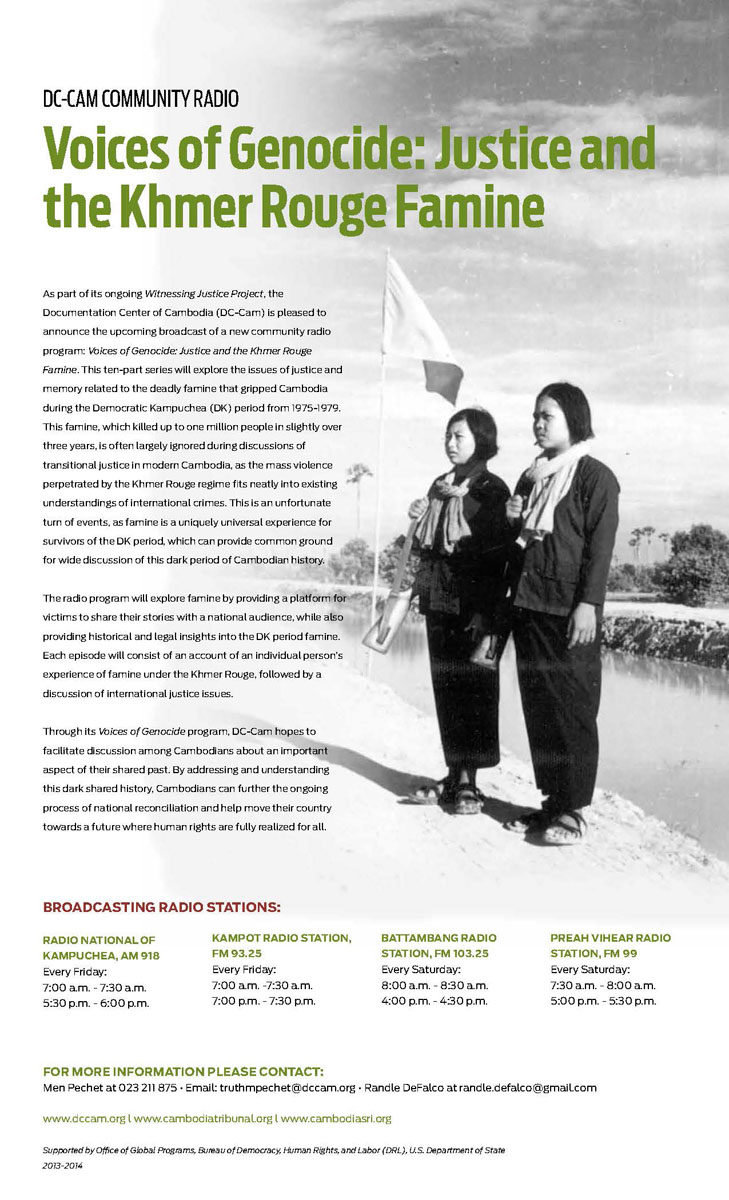Home / Health / Public Outreach / Radio
Radio programming is an important means of outreach to Cambodian people throughout the country. The majority of Cambodians, especially survivors of the Khmer Rouge period who live in predominantly rural areas, have little access to print and news media. Thus, radio remains a culturally popular medium and is often the sole source of national news and information for many Cambodians. The reliance of citizens, especially rural citizens, on radio broadcasts can lead to the manipulation of public perception when the radio messages are used for purposes of political propaganda. In general, because of this risk, the creation of accurate and objective educational programming remains a pressing need in Cambodia.
Since 2002, DC-Cam has been reading selected articles from Searching for the Truth magazine and portions of such books as Anne Frank’s Diary on a local radio station, Women’s Media Center (WMC), FM 102, which reaches many Cambodian provinces. DC-Cam has produced a radio program on this station two times a week. In addition, our staff members have been guest speakers on an FM 102-hosted talk show which focuses on the Khmer Rouge.
In 2005, DC-Cam expanded its broadcasts to Battambang (also covering portions of Siem Reap, Banteay Meanchey, Pursat and Pailin), Kampong Cham, Sihanoukville and Svay Rieng. We explored various radio formats, such as forums and listener hotlines, to encourage audience participation in discussions of issues related to Democratic Kampuchea. In order to increase the cost-effectiveness of our programming, we opened a new studio at DC-Cam, enabling us to prepare high-quality, pre-recorded tapes and send them to provincial radio stations.
Early in 2008, DC-Cam discontinued broadcasting on WMC, FM 102, since the station now produces its own program about Khmer Rouge history. However, DC-Cam continues to read selected articles from Searching for the Truth, and the publication, Brother Enemy, A History of Democratic Kampuchea (1975-1979), for Kampot Station, and works with VOA (Voice of America Radio).
In 2012, DC-Cam initiated a new radio program entitled “Voices of Genocide Survivors (VoG): Famine in Democratic Kampuchea and Case 002 at the ECCC,” which explores the famine which occurred during the Democratic Kampuchea regime. The goals of this program are to provide survivors with legal and historical narratives of a major and often-overlooked source of suffering and mortality under the Khmer Rouge and to provide a common platform for survivors of the Cambodian genocide to share their individual experiences. Through these specific goals, the program aspires to contribute to the larger objective of reconciliation and justice in Cambodia. In total, the VoG project will produce ten episodes, each discussing an aspect of the famine during the Khmer Rouge period in Cambodia. Each episode will be broadcast and re-broadcast as widely as possible throughout Cambodia each month. Moreover, after the initial broadcast, the program will be combined into an anthology and shown throughout Cambodia to highlight the issue of famine, utilizing program episode replays at public forums. These forums will be hosted at sites historically relevant to famine under the Khmer Rouge regime and will engage local survivors, students and community leaders in order to foster community engagement. DC-Cam plans to make the archived radio program series freely available to the public and researchers seeking more information on the Khmer Rouge famine and/or associated legal issues.

